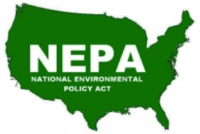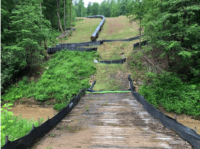UPDATE: Feds Demand Court Reinstate Key Corps of Engineers Project Permit

A Montana federal judge who overturned the U.S. Army Corps of Engineers' water-crossing construction permit program for thousands of power and energy projects has denied the government's plea to immediately stay that ruling, which termed the agency's Nationwide Permit 12 illegal.
Judge Brian Morris, chief judge of the U.S. District Court in Great Falls, Mont., on April 28 rejected the U.S. Justice Dept. motion for the stay, but said he will hear briefings from the government and make a final ruling by May 11
The Justice Dept. says it intends to appeal to the U.S. appellate court in San Francisco as soon as May 12 if Morris does not reverse his decision.
On April 15, Morris rejected the NWP 12 permit for Keystone XL, which was the subject of the lawsuit at issue, and vacated the Corps program. He said the Corps did not consult with the U.S. Fish and Wildlife Service on Endangered Species Act protections when it last issued the permit in 2017.
The roughly 1,200-mile Keystone XL pipeline crosses about 1,000 water bodies in its Alberta-to-Nebraska route.
Jennifer Moyer, chief of the Corps regulatory program, said in a court document she estimates that the agency has 5,500 pending NWP-12 pre-construction notifications awaiting verification.
With the blanket permit halted, routine utility projects will only be able to proceed after receiving individual permits that require a case-by-case review, she said. Activities covered by NWP 12 include any U.S. utility line project, such as electric broadband, fiber optics, telephone and television cables, as well as oil and gas pipelines.
Under the Morris ruling, the Corps is broadly enjoined from authorizing any dredge or fill activities under the permit. The legal action means a delay for projects to gain individual permits by at least six months.
“In 2018, the average time to receive an NWP verification from the Corps was 45 days, while the average time to receive a standard individual permit from the Corps was 264 days,” Moyer said.
The NWP 12 permit "is essential to the construction and maintenance of transmission and distribution lines that are vital to the resilience of the nation's electrical grid,” says a statement from Edison Electric Institute, which represents investor-owned utilities.
The ruling is “extremely disruptive and contrary to the public interest,” and an “abuse of discretion,” the Justice Dept. said. “The court’s remedy currently forbids any use of the NWP 12 for any possible project anywhere in the country,” the department said, calling it an "overreach" that will hinder maintenance, repair, upgrade or removal of any utility line.
"Pipeline companies, utilities, engineers, land developers and construction companies that rely on Nationwide Permit 12 for utility line and trenching activities in and around potential wetland areas will need to carefully re-evaluate their ability to conduct work under this general permitting tool," says Andrew Brought, attorney in Kansas City for Spencer Fane LLC.
NWP 12 Challenge
The legal challenge had been expected.
Attorneys at Houston-based Locke Lord LLP said in an analysis that the government was not set to "simply accept such a broad order from the District Court on an issue with such far-ranging implications for construction of energy and infrastructure projects across the country–especially at a time when those industries and the nation’s economy as a whole are already in drastic decline due to the continuing COVID-19 pandemic."
They add that Morris' opinion "sets up a clear opportunity" for legal challenges to other aspects of the Corps national permit program. "That fact surely has not been lost on the plaintiffs in this case and other opponents of the program, and such a challenge should be expected as soon as they find the right opportunity."
The attorneys add that while the Corps is set to give refocus of the permit program "the highest priority, it is likely that it will take at least until 2021 before it can be completed."
They note new issues the agency also must consider with the just-revised Navigable Waters Protection Rule, which will limit water bodies subject to federal jurisdiction when it takes effect on June 22.
Other Corps Issues
Meanwhile, another key Corp permitting function is also under fire.
Advocacy group Delaware Riverkeeper Network on April 22 filed a complaint in federal district court in New Jersey, claiming the Corps violated the National Environmental Policy Act and U.S. Clean Air Act when it issued a Section 404 permit under the federal Clean Water Act to allow construction of a new terminal on the Delaware River that will transfer liquefied natural gas from the Marcellus shale region for export abroad.
The environmental group, which has been fighting the facility, claims the Corps did not involve the public in drafting an environmental assessment for the project, failed to provide a record of decision and improperly limited the scope of air emissions to be included in its analysis.
And in separate action related to Corps of Engineers infrastructure issues, the U.S. Government Accountability Office in an April 22 report recommended that the agency set performance measures to assess progress made by its nine "centers of standardization" to ensure use of standard designs for U.S. Army facilities and reduce construction costs. It also recommended setting performance measures to reduce the occurrence of change orders.
GAO also said the management board of the centers needs to boost analysis of information about how frequently centers participate in construction projects and how doing so helps improve project cost and schedule metrics and cuts change orders.




